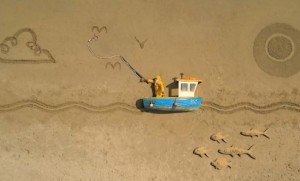…the new standards don’t inhibit the use of technology in my curriculum. As a teacher of ELA, I have found that the biggest change with my delivery of instruction is my pacing. I have definitely changed from a delivery model of destination-focused instruction to journey-focused instruction. I need to add VERY quickly that I do not mean test-focused when I mention destination. Focusing on the tests to come (and embedded assessments) is certainly an important aspect of my instruction because I know that the Code of Ethics requires me to prepare students specifically for the state tests. No, I was simply referring to instruction that doesn’t stop, but keeps a steady tempo, marching on to the current destination. I am a destination-focused traveler, for example. I don’t want to stop for anything; I just want to arrive. I know the reason for that is that I don’t travel well and get sick quite easily in anything that moves. The reason for teaching that way is different. I began as a destination-focused teacher because I felt like I had “X” number of concepts to “cover” and not a lot of time.
So, in that sense, I believe that experience AND the new standards have helped me evolve into a journey-focused facilitator. All of the words I chose there have significance to me. First of all, I believe that focusing on the journey in a classroom means, figuratively, wiggling your toes into the sand and maybe building some sand castles as important experiences for the destination of going to the beach. It isn’t going to be all about running down and jumping into the ocean, although the ocean will always be a goal in sight. In my CCSS-based classroom, then, it is all about reading a text multiple times and learning how to closely read text and finding text in multiple genres that tie to my anchor text to deepen understanding.
 But this post isn’t meant to be focused on how the standards have changed our instruction. The point is that the result of being a destination-focused teacher is that technology is a helpful tool to provide the rich learning experience involved in teaching with the CCSS. For instance, I have found several annotator tools online that make it easy be sure that my students (who all have computers) can all use multiple colors to code their responses and can add neat/legible notes throughout their text. My students have enjoyed building timelines online, as well, because it is a much more simplified process and looks “cool” when they are done. Besides having helpful tools and apps available, they also are able to locate primary source documents and a variety of classic and nonfiction literature at no added expense to my classroom. Those are all really must-haves in the CCSS classroom, and technology is making that possible for my students.
But this post isn’t meant to be focused on how the standards have changed our instruction. The point is that the result of being a destination-focused teacher is that technology is a helpful tool to provide the rich learning experience involved in teaching with the CCSS. For instance, I have found several annotator tools online that make it easy be sure that my students (who all have computers) can all use multiple colors to code their responses and can add neat/legible notes throughout their text. My students have enjoyed building timelines online, as well, because it is a much more simplified process and looks “cool” when they are done. Besides having helpful tools and apps available, they also are able to locate primary source documents and a variety of classic and nonfiction literature at no added expense to my classroom. Those are all really must-haves in the CCSS classroom, and technology is making that possible for my students.
The bottom line is, I think, that the standards (and I’m fairly familiar with the ES, too) have neither inhibited or required the use of technology, per se. Teaching in response to the standards, however, could end up encouraging increased use of technology. Um, not to be too cute, but should that could be a should?

I love this post! So well written and so many perfect metaphors. My favorite is the “tempo” comparison–pacing is so difficult for me and as a music person I can connect to the feeling of having a steady tempo of instruction throughout the year.
What online annotation tool do you use? I have trouble with reading online due to the lack of annotation capabilities so would love to try out something like that.
-Kari
This past year I used: http://annotator.thinkport.org. However, you have to import content and there isn’t a good way to share. I still like this site and might return to it because it is the most simple that I have found. It would be helpful, for my purposes, though, if it would allow the students to share with me. I got around that with screen shots, but…for this next year, I intend to try: http://a.nnotate.com. I have played around with the sample this summer and it looks to be much more flexible. This also might suit your personal needs for online reading. Let me know!
Thanks! I’ll try them out. I know my department would be extremely excited about this.
Not having a background in education, I find it interesting how different Fellows from different disciplines and different regions of the state have approached this question. It is great to hear the diversity and learn how it applies to each of you individually.
It really is!! I’m so thankful to broaden my perspective about approach, resources, research, and practice through my Fellowship.